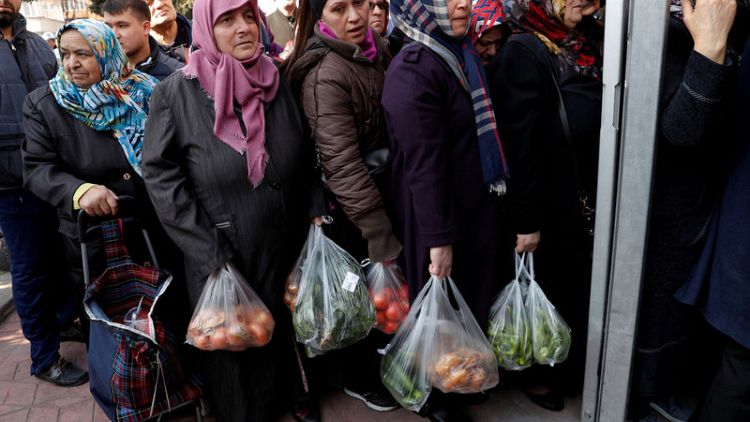By Ezgi Erkoyun
ISTANBUL (Reuters) - Turkey could expand a government scheme to sell cheap vegetables in Istanbul and Ankara across the country after local elections next month, President Tayyip Erdogan said on Wednesday, a move that economists said could prove financially unsustainable.
Battling a sharp rise in food costs which they blame on traders hiking prices, Turkish authorities this week opened their own markets to sell produce directly to shoppers.
Under the government initiative, municipalities are selling vegetables at around half the prices recorded by the country's statistics agency last month, when food prices surged 31 percent. Each person is allowed to buy just 3 kg of each item.
"God willing, after the elections, with the organisation of municipalities we might take steps to carry these sales to the very remote corners of Turkey," Erdogan told traders.
Several supermarket chains matched the prices set by the government stalls this week, according to their stores and websites. If the reductions are sustained, they could help curb February food inflation levels, which are based on sales at major retailers.
Food accounts for about a quarter of the basket of goods used to measure Turkish inflation, which stood at more than 20 percent in January.
Rising living costs and the wider impact of Turkey's lira crisis last year, when the currency lost 30 percent of its value against the dollar, are a major issue for voters ahead of the March 31 local elections. Erdogan's ruling AK Party faces serious challenges in several large cities.
CONCERNS
But Erdogan's suggestion that Turkey could extend the initiative after the elections has caused concern among economists who say the costs for the government are not sustainable over the long term.
"I would like to think this is a stop-gap measure that will be in place until the local elections to protect the government from an electoral backlash due to high food price inflation," said Inan Demir, senior emerging markets economist at Nomura.
"I honestly don't expect that this will be extended after the election."
Extending the initiative would also raise concerns about the level of government intervention in markets.
While traders attribute the increased food prices to bad weather and rising transport and labour costs, Erdogan has accused retailers of exploiting the situation and hiking prices.
"God willing, we will give these economic hitmen a solid Ottoman slap," Erdogan said.
Wholesalers say the authorities are not only competing unfairly with traders but are also making significant losses.
Yusuf Yilmaz, head of the wholesalers' association in Serik, a southern region famous for its tomatoes, said the wholesalers were selling tomatoes for 3.8 lira per kilo to authorities, who then sold them at municipality stalls for 3 lira.
(Additional reporting by Karen Strohecker in London, Ece Toksabay and Tuvan Gumrukcu in Ankara; Editing by Dominic Evans and Gareth Jones)
